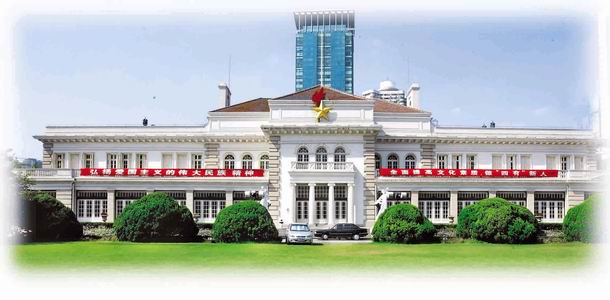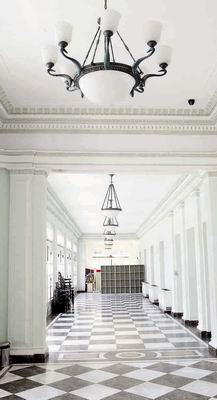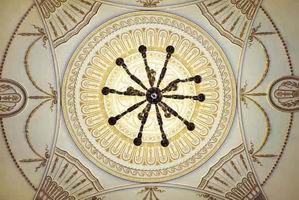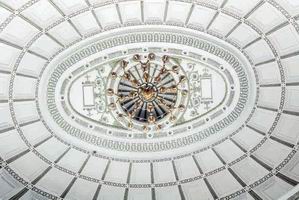Shanghai Daily news

The grand building, built by Sir Elly Kadoorie, now
houses the China Welfare Institute¡¯s Children¡¯s Palace.

The marble Hall inside the building.


The ceiling and lights are elegantly
designed.
The Marble Hall on 54 Yan'an Road W. shocks every visitor at first glance
with its incredible grandeur and luxury. More than 80 years ago, the former
owner, Sir Elly Kadoories, an Iraqi Jew, was also amazed and slightly horrified
when he first saw his future home.
Covering an area of 1,500 square meters,
the two-storey mansion with more than 20 rooms could be the home of a
king.
White Italian marble is everywhere -- on the walls, columns,
fireplaces, staircases and platforms. The inside is a unique in color with
vinegar green and cream hues.
The stunning ballroom is 20 meters high, 25
meters long and 50 meters wide with an exquisite white ceiling, giant mirrors
and crystal chandeliers.
A room on the first floor, originally used for
playing poker, even has an exotic ceiling which is in a curved shape with golden
patterns.
Born in Baghdad in 1867, the Kadoories came to Shanghai from
Bombay in 1880 as an employee of the Sephardi Jewish firm David Sassoon &
Sons.
Later Elly Kadoories left to start his own business with US$500 and
became a wildly successful real estate and hotel owner, merchant banker and
rubber plantation owner.
``Kadoories' wife died saving her maid from a fire
in their London home in 1919, which brought deep grief to her beloved younger
son Horace,'' says Xue Liyong, an old house expert at the Shanghai History
Museum.
``He purchased the land in 1920 for a new home and entrusted his
friend, architect Graham Brown, who was famed for his inspiration after drinking
alcohol. While the house was built, Kadoories returned to Britain with his
children.''
With Kadoories gone, Brown developed brave ideas. He drew up a
blueprint of a palatial space, the budget of which was as much as the annual
income of 20,000 local workers at that time.
Touched by the outstanding
design and Brown's devotion, who was later hospitalized for alcoholism,
Kadoories accepted the new home which took four years to finish and was much
more imposing than expected.
Kadoories hosted many activities for the Jewish
Community in the house. Large-scale parties, banquets and dancing balls were
held here during community meetings and Jewish holidays.
``Brown also
designed secret paths and rooms in the house, which helped some Kadoories and
their Jewish friends escape from Japanese soldiers during the 1940s,'' says Xue.
The second floor features mostly bedrooms for the hosts and guests. But
there's a secret room for treasures concealed behind a thick steel door which
looks as if it's part of the wall.
``Most visitors to the house are Jews
from Russia and Israel, who want to know more about the life of Jews in Shanghai
from early last century,'' says Dong Lei, from the China Welfare Institute
Children's Palace, which moved into the house after the founding of the People's
Republic of China in 1949. ``A Jewish visitor said his uncle used to work for
the family as servant and lived in the back room.''
Xue says the Japanese put
some Kadoories family members into detention camp in Zhabei District in 1943.
Kadoories died there on February 8, 1944 and was buried in the Jewish Cemetery
on Hongqiao Road. Elderly son Lawrence and his brother Horace were placed under
house arrest in the Marble Hall. After the invasion of the Japanese, the house
became a recreation center for British and American soldiers. Lawrence left for
Hong Kong in 1945.
Under the advice of Soong Ching Ling, widow of Dr Sun
Yat-sen and the late honorary vice chairwoman of China, the mansion became the
China Welfare Institute Children's Palace after 1949 for children to enjoy
recreation and cultivate hobbies.
``Children love the house very much and
feel they are in a fairy tale palace,'' says Dong. ``Today, some middle-aged
former palace residents often gather in the house to recall their happy time
here. Kadoories' grandson Michael Kadoories visited here several times. Both he
and his father Lawrence were happy to see their home become a paradise for
gifted children.''



